
An update from Senator Ashby - January 2025
Hello Senate District 8,
I hope this communication finds you well and off to a promising start in the New Year. I am reaching out with an update on how things are going in our Senate District, which covers most of Sacramento County, including the Cities of Sacramento and Elk Grove and many unincorporated areas of Sacramento County. The district is home to a million people, and as you already know, is a diverse hub of culture, creativity and community. I am honored to serve as your State Senator, and as always, I want to begin and end each communication with my sincerest gratitude to you for allowing me the privilege of service to Sacramento, and more broadly, to the great state of California.
There are really two components to this position. One is legislative and involves both writing and reviewing potential legislation for our State, and advocating for budget allocations for our district priorities. The other is district outreach and service, which is centered on being present in the communities I serve, so that our team efforts are rooted in the truest convictions of the people I represent. This part of the job is much easier to achieve with great regional partners – District Attorney, Sheriff, Mayors, Councilmembers, Supervisors, School Board members, and everyone else stepping up to serve the region in any capacity.
The legislature runs in two year cycles. I was elected in late 2022, so my first two year legislative session has just come to an end and the second two year session has just begun. I’m halfway through my first four year term in the California State Senate. It feels like a good and appropriate time for me to share with you an update on both aspects of my role as your Senator.
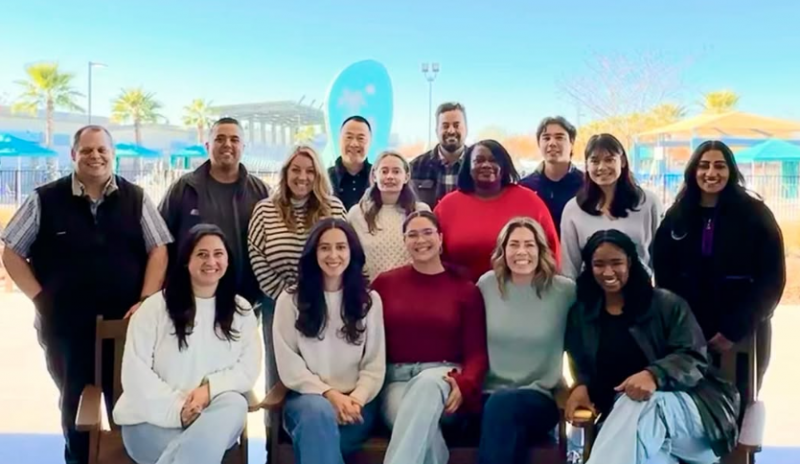
(Photo: Team Ashby and special guest former City Manager, Howard Chan, at the North Natomas Aquatics Complex.)
In our first two years, my team and I worked diligently to identify and secure over $200 million in state funding for the Sacramento Region and some key legislative priorities. I am proud of the work we’ve done to ensure budget dollars are going out to our communities, and I will continue to fight for our region as long as I am in a position to do so. Here are some highlights of the programs these dollars are going towards:
- $5 million in statewide, annual on-going funding to allow former California foster youth to attend an in-state college, debt free;
- $8 million for the City of Refuge in Oak Park to support community services, including housing, for victims of sex trafficking;
- $4.6 million to the City of Sacramento for Old Sacramento State Historic Park;
- $3 million for the California State Museum in Downtown Sacramento;
- $1 million to the Sacramento Sheriff’s Office for an aquatic vessel for environmental clean-up of the Sacramento waterways;
- $1 million to Wilton Rancheria to bolster their Missing and Murdered Indigenous Person investigations and human trafficking prevention programs;
- $29 million for SacRT to expand local infrastructure and transportation access through the Caltrans Transit and Intercity Rail Capital Program Grant;
- $1.2 million to strengthen the Sacramento Region’s climate resilience programs;
- More than $440,000 to the City of Elk Grove to expand their heat resilient transportation plan;
- More than $780,000 to the City of Sacramento to expand pedestrian and cyclist access throughout the city;
- $1 million to the City of Sacramento for community improvement projects:
- $150,000 for the Mack Road Valley Hi Community Center Expansion Project
- $200,000 for Midtown’s Paragary Pathway lighting
- $100,000 for Northgate’s Taco Plaza
- $250,000 for local venue access to the Sacramento Convention Center & Performing Arts District
- $100,000 for safety and lighting enhancements at Alder Grove and Marina Vista
- $200,000 for Shared Spaces Project to increase accessibility and safety improvements in the Handle District
- $1 million to the City of Elk Grove for community improvement projects, including the relocation of the new Elk Grove Library;
- $55 million in statewide funds to the Regional Water Authority for Lower American River Water Resilience projects;
- $150,000 to Sacramento Street Soccer to improve and expand facilities;
- $200,000 to Fairytale Town to complete the new Welcome Center;
- $1 million to B Street Theatre in furtherance of their mission to support the arts in Sacramento;
- $70 million in direct investments for homelessness outreach programs in the Sacramento region through the Department of Housing and Community Development;
- $2.1 million allocation to Sacramento County for Transitional Age Youth programs, which include support for young adults, ages 18-25, to secure and maintain stable housing, with priority given to youth formerly in the foster care or probation systems;
- $25 million California Transportation allocation through the Local Partnership Program.
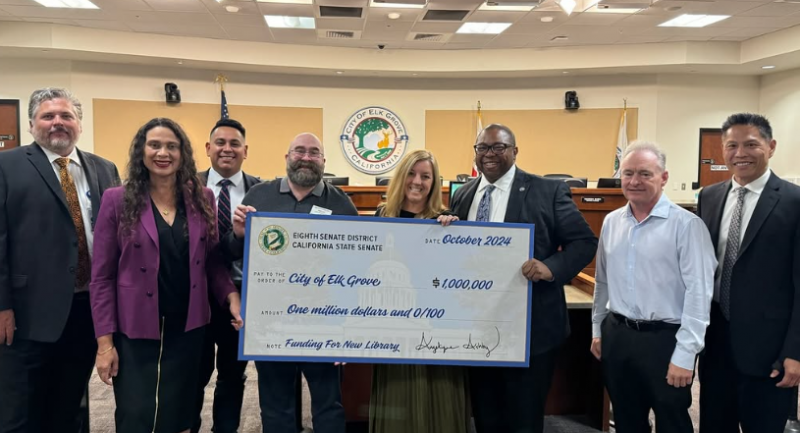
(Photo: Senator Ashby presenting a million dollar check to Elk Grove City Council & Sacramento Public Library.)
In addition to state funding sources, we are so fortunate in Sacramento to have great federal representatives, Congressman Ami Bera and Congresswoman Doris Matsui. Our office has partnered with both representatives to support their efforts to secure federal funding for the district.
Here are a few highlights of federal funding coming to projects in Senate District 8, as a result of their hard work and our collective partnerships:
- $17.8 million allocation to La Familia Counseling Center from the federal government’s Environmental and Climate Justice Community Change Program to address climate challenges and reduce pollution while further strengthening communities;
- $9.8 million grant allocation from the Federal Transit Administration for the development of the Dos Rios Sacramento Regional Transit Station, further connecting the Sacramento Region; and
- $11.6 million allocation to the Sacramento Municipal Utility District (SMUD) for the installation of electric vehicle charging stations across the region, further reducing transportation-related greenhouse gas emissions in California.
We have two offices: one on the capitol campus for our legislative team and one in the community for our district team. Both offices are in the center of the district in downtown Sacramento. Our team has garnered a well-earned reputation for working hard and producing results. In just two years we have taken over 5,000 meetings and attended over 800 events all across Senate District 8. We have hosted several of our own events, including webinars to connect constituents to state resources, agencies, and opportunities. We have taken in over 11,000 emails and calls about legislation and budget concerns and have opened nearly 3,000 constituent cases that range across a broad spectrum of help sought by those we represent.
Your Senate District 8 team is here to help, so feel free to contact the team at (916) 319-0309. And please follow us on Twitter, Instagram, or Facebook to keep up with our daily activities, events and announcements.
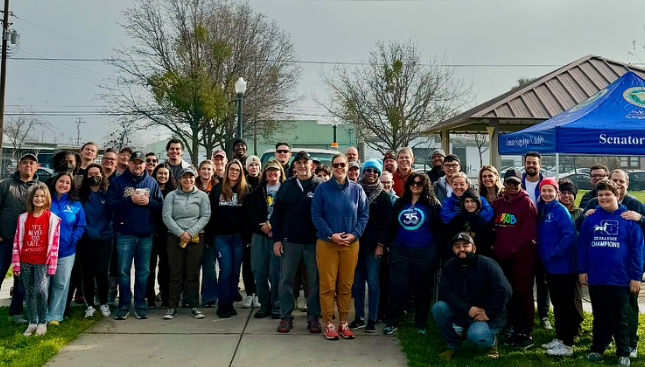
(Photo: MLK Day of Service at Winner’s Circle Park in Sacramento.)
Much of the role to serve our district is about partnering. Here are some examples of projects our team has partnered on with other elected officials or organizations throughout the region.
- Partnered with the City of Sacramento on Creative Economy retention and advancement opportunities such as music festivals and venues;
- Advocated for increased access to professional sports in the Sacramento region such as Major League Baseball and Soccer, including support for a new Sacramento Republic stadium;
- Partnered with Sacramento State University to advance initiatives and secure funding for a number of economic development projects including the California Mobility Center;
- Supported the Sparkz Energy PowerForward Proposal with CalSTART, in partnership with SMUD, Sparkz, and the California Mobility Center, to advance clean energy solutions and technological innovation;
- Worked with the Sacramento business community to revitalize and invest in Sacramento’s urban core;
- Sought investment opportunities to enhance public transportation in neighborhoods across the region including Oak Park, Midtown, and the River District;
- Expanded support for small business growth, environmental sustainability, access to education, literacy, and creative economies, ensuring Sacramento remains at the forefront of innovation and development; and
- Served as Co-Chair of the Sac12 Committee, advocating for Sacramento State University’s inclusion in a higher rated athletic conference.
I am honored to not only serve and advocate for Senate District 8, but to fight for families across the state in my role as your State Senator. I have received a few statewide awards in my first legislative session, and am grateful for the recognition of our hard work.
- John Burton Advocates for Youth Champion Award (Champion for Foster Youth)
- Legislative Champion for California Community Colleges
- California Legislator of the Year for The Commercial Interior Design Association
- Legislator of the Year for the California Family Justice Network (Champion for Victims of Domestic Violence)
- League of California Cities Distinguished Legislative Leader Award
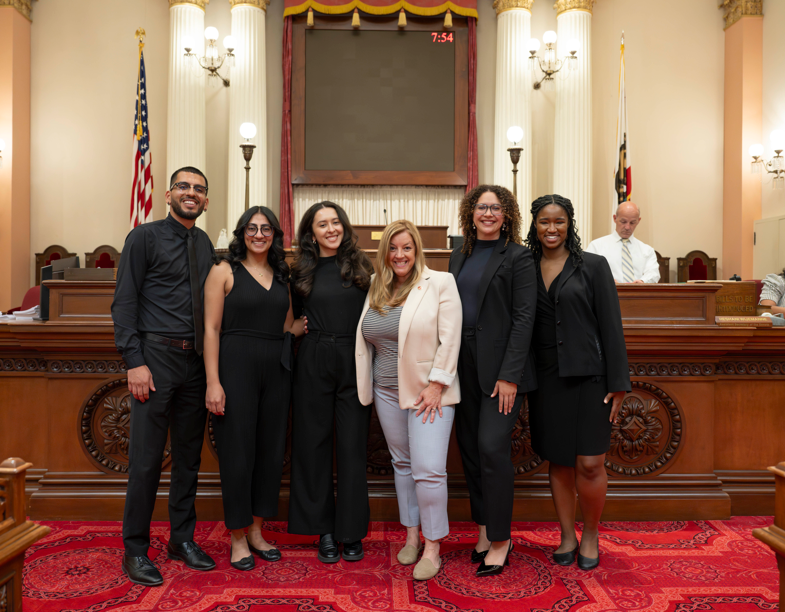
(Photo: Senator Ashby with her 2024 Legislative Team.)
During my first legislative session, our team focused our legislative package on bills that supported foster youth, increased protections for women and domestic violence survivors, and made our state safer for all. To date, the Governor has signed 23 of my bills into law. Below is a detailed list of bills I authored that are now California State law, with links to the exact bill language.
1. SB 307: Debt Free College for Foster Youth
SB 307, Fostering Futures, makes debt-free college a reality for former foster youth in California, covering all of their unmet needs in California community colleges or four-year universities, including books, food, and lodging. In its first year of implementation, over 800 additional former foster youth enrolled in college.
This bill is called the Patric Brian Ashby Act, as it is named in honor of my late father, who dedicated his career to improving the lives of foster youth across the State of California.
(Over 50% of people experiencing homelessness identify themselves as former foster youth.)
SB 321, the Youth Literacy Act, based on a successful City of Sacramento and Sacramento Public Library model program, facilitates partnerships between public libraries and elementary schools to ensure every third grader in the state has a library card and access to a public library.
(California has a major opportunity to improve on third grade reading levels. Over 70% of people incarcerated in our correctional system read at or below a third grade level.)
3. SB 963: Human Trafficking Detection Act
SB 963, the Human Trafficking Detection Act, requires acute care hospitals to implement programs for identifying victims of human trafficking and domestic violence – ensuring a unified, patient-centered, and trauma-informed approach to care is a statewide imperative based off a Sacramento model program.
(Sutter Sacramento implemented this program as a model and as a result helped dozens of women, and some children, to escape violent and dangerous situations. This bill is a codification of Sutter’s great work.)
4. SB 989: Strengthens Investigations for Domestic Violence Victims
SB 989 improves how authorities investigate deaths that might involve domestic violence by marking them as a suspicious death case, allowing more families to get answers about their loved ones’ deaths.
(This bill was inspired by the heartbreaking story of Joanna Hunter, who lost her life to what her family believes to be a domestic violence murder, but lacking key investigation at the time of her passing, her official cause of death is listed as suicide – leaving the family without an opportunity to seek justice. And allowing her former partner to go on to hurt other victims – which he was in fact later convicted of in a neighboring state.)
5. SB 1180: Emergency Medical Service Reimbursement Act
SB 1180, the Emergency Medical Service Reimbursement Act, mandates reimbursement coverage for services provided by community paramedicine, triage to alternate destinations, and mobile integrated health programs and will allow City of Sacramento emergency responders to bill for appropriate healthcare destination treatment services.
(This bill allows medics to take patients wherever they need to go to best address the problem they are presenting and still be able to bill insurance for the service. This helps reduce unnecessary trips to our emergency rooms and frees up our frontline medical providers to deal with more severe medical situations.)
6. SB 314: Sacramento County Fair and Independent Redistricting
SB 314 establishes an Independent Citizens Redistricting Commission for Sacramento County, ensuring fair and impartial district boundaries starting in 2030.
(Previously, the elected officials drew their own boundaries.)
7. SB 350: Student Support for Mental Health & Bereavement
SB 350 increases the amount of days that a student can be excused from school due to the death of an immediate family member to attend a funeral service, grieve, or obtain trauma assistance.
(Prior to this bill becoming a law, students who lost a parent or sibling were only allowed a single day of excused absence from school.)
8. SB 374: California Firefighters’ Memorial Park Restoration Act
SB 374 creates additional revenue for the California Fire Foundation to renovate and update the California Firefighters’ Memorial in Capitol Park to honor firefighters lost in the line of duty.
9. SB 578: Trauma-Informed Harm Reduction Model
SB 578 seeks to reduce the harm a child endures from being separated from their family through a court proceeding. The bill establishes a trauma-informed analysis be provided to judges by a social worker in advance of any removal decision. The bill was sponsored by Juvenile Court Judges and has already had a positive impact in the courtroom. The bill neither seeks to increase nor decrease removals, but rather to assist judges in having accurate and detailed options and information – allowing for the best possible outcome in every instance of such a hearing.
(Previously, there was no standard nor a requirement for trauma informed or harm reduction opportunities to provide relevant background for judges as they face this impossibly difficult analysis.)
10. SB 659: Groundwater Recharge Action Plan
SB 659 directs the Department of Water Resources to provide recommendations for increasing groundwater recharge opportunities, thereby stabilizing California’s groundwater supply and enhancing climate resilience, greatly impacting for the better, Sacramento’s water access and resilience.
11. SB 739: Construction Manager At-Risk for the Elk Grove Zoo
SB 739 allows the City of Elk Grove to utilize a more efficient and cost-effective construction contract for the Sacramento region’s new zoo in Elk Grove. This bill is a critical component to a measured funding process that will create a way for Elk Grove to lead the construction of a new state of the art zoo for the greater Sacramento region.
(The City of Sacramento voted not to expand nor to invest in moving the Sacramento Zoo. The national accrediting entity for zoos has made it clear that the zoo must grow, move, or close. Elk Grove stepped in to lead an effort that will allow for an incredible partnership for both conservation and education via a new site for the beloved regional amenity.)
12. SB 788: Cider and Perry Equity in Manufacturing
SB 788 allows craft brewers across California to increase production via concurrently held cider, perry, and beer licensing, creating parity with large manufacturers and supporting small business growth in the craft beer industry, particularly in Sacramento.
(This bill was a top priority for craft brewers across the state.)
13. SB 1005: Youth Peer Courts
SB 1005 allows youth, when going through the juvenile justice system, the option to enter into a youth peer court program to better ensure rehabilitation and justice for both the youth offender and the victim. This model is a renowned best practice for intervention in the life of young people caught in a generational cycle of criminal activity.
SB 1313 increases the safety of our streets and curbs the misuse of driver monitoring safety technology by prohibiting the use and sale of manufactured and homemade devices used to interfere with vehicle safety systems, such as technology that mimics hands holding the steering wheel.
15. SB 1464: Clarifying Cardiology Procedures in Ambulatory Surgery Centers
SB 1464 allows ambulatory surgery centers that are licensed to provide cardiac laboratory services, but do not offer them, to remain in the Elective Percutaneous Coronary Intervention (PCI) Program. This bill allows cardiologists greater access to patients, while reducing costs for minimally invasive procedures.
16. SB 1498: Cannabis and Industrial Hemp Advertising Act
SB 1498 allows City Attorneys, County Counsel, or the Attorney General to sue cannabis and hemp companies for violations of existing state law that prohibit cannabis and hemp advertising from being attractive to children.
As Chair of the Senate Business, Professions, and Economic Development Committee, I also authored 7 bills to address regulatory oversights and amendments for boards and business bureaus such as the Medical Board and State Contractors Board – all of which require regular review and revision for compliance and continuity.
The Governor signed all of the above bills into law. There are a few bills we introduced that didn’t make it through the legislature, or were vetoed by the Governor. Some of those bills we will reintroduce and try again to champion. One example is a bill that makes the narcotic Xylazine illegal for personal possession. It is a drug used for large animal veterinary services. It is however often coupled with fentanyl for street use, creating the deadliest illicit drug combination in the nation. Xylazine is impervious to Narcan and thus increases lethal outcomes. I introduced a bill to make Xylazine more difficult to attain and possess. It was held by the Assembly Public Safety Chairman last year. I am reintroducing the bill again this year and am hopeful it will make its way to the Governor.
In addition to being the Chair of the Senate Business, Professions, and Economic Development Committee, I am also a member of several other policy committees: Judiciary, Energy, Governmental Organization, and Revenue and Taxation. I am also grateful to Pro Tem McGuire for providing me the opportunity to be on his leadership team as Assistant Majority Leader.
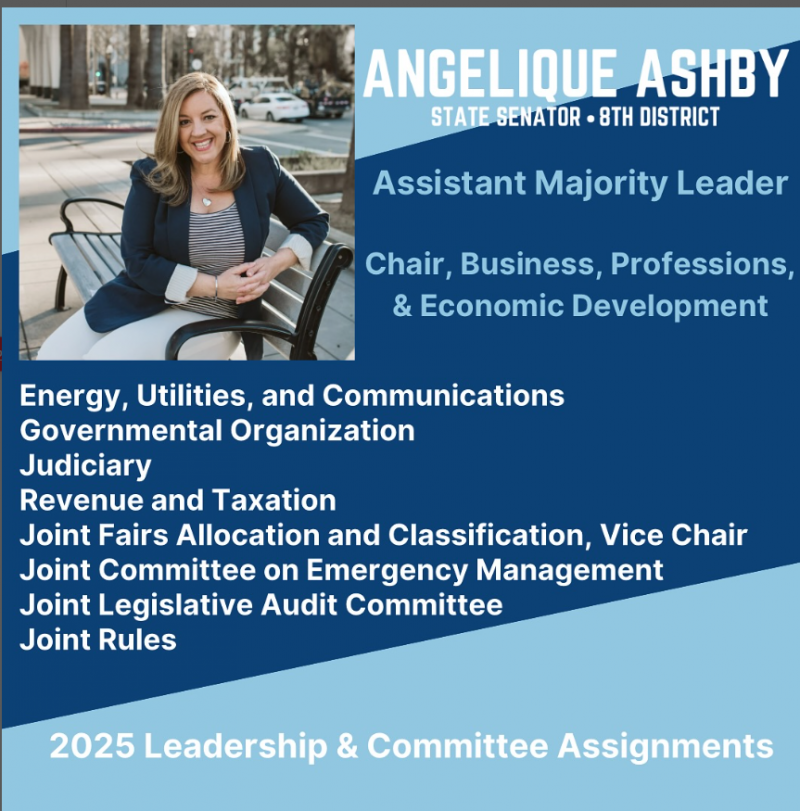
For more information on the legislation I have worked on check out my team’s legislative package here. To hear more about what we are working on this year follow us on social media or check out the state legislature’s ongoing legislative tracker here.
It is my hope that this update gives you an idea of what I have been working on and how our team is serving the community. Obviously this is just a glimpse at our efforts. We work hard to serve Senate District 8 and will continue giving our best every day. We are excited for another year of service and as always, will continue to serve our constituents with professionalism and dedication.
If we can provide assistance in any state related matter, please don’t hesitate to call (916) 319-0309 or visit our website here. If you are interested in learning more about the committees I serve on, or the bills we are considering in committees or in the Senate chambers please feel free to reach out to the team or follow us on any social media platform.
Thank you for the opportunity of a lifetime.